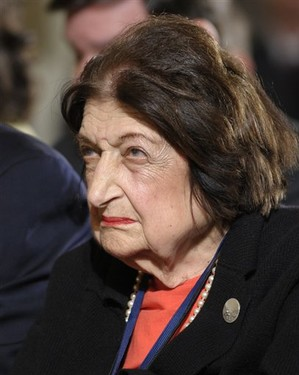Is President Obama really the Deficit-Cutter-in-Chief? After racking up massive deficits through his various Stimulus programs and facing continued losses from Obamacare, the White House is now trying to portray Obama as taking a leading role in solving the problem. Time after time, White House senior adviser David Plouffe told Sunday morning talk show hosts yesterday that Obama’s 2012 budget was already proposing ways to reduce the deficits over the next decade by $1 trillion. Surprisingly, not a single host challenged him on his math.
And the Obama administration strategy seems to be working. A new CNN poll conducted April 9-10 shows that by a 48% to 35% margin Americans think that Obama and the Democrats are more responsible than Republicans for the budget agreement to cut spending.
Mr. Plouffe asserted: “Well, first, on the 2012 budget, that would be $1 trillion of deficit reduction over the next decade and lowest level of domestic spending since Dwight Eisenhower. And he said it in the State of the Union, that was just a start.” He told this to Fox News Sunday’s Chris Wallace, and he repeated it almost word-for-word on NBC’s Meet the Press, ABC’s This Week with Christiane Amanpour, and CNN’s State of the Union.
Yet, the assertions of bold deficit-cutting are absurd. The Congressional Budget Office just reported in late March that Obama’s newest budget plans will increase the deficits over the coming decade by $1.2 trillion, hardly the $1 trillion cut that Mr. Plouffe claims. The CBO, which has been designated by the White House as the ultimate referee on spending questions, was rather blunt in dismissing the president’s numbers, explaining that he was underestimating the expected cost-increases for existing programs as well as the price-tags of new ones.
But empty promises are not new to Mr. Obama. He repeatedly promised “a net spending cut” during the 2008 presidential debates and on the campaign trail. And yet Federal government spending under his watch has soared from 20.9 percent of GDP in 2008 to 24.3 percent in 2011. At the end of the Clinton administration, Federal spending was at 18.2 percent of GDP.
Mr. Plouffe’s comparison with President Eisenhower’s “domestic spending” spending is just bizarre. President Eisenhower oversaw Federal spending for the eight budgets from 1954 to 1961. Net of defense spending, his budgets consumed between 5.7 and 9 percent of GDP (see the figure available here). By contrast, Obama’s non-defense spending budgets are never expected to go below 19 percent of GDP. If domestic government spending were really cut to Eisenhower levels, we would currently be enjoying a budget surplus.
President Obama probably really believes that cutting a $3.82 trillion Federal budget by one percent, $38 billion, is “historic” and tough, though much, much larger cuts have been made in the past. After all, the president originally claimed that he couldn’t cut the budget by more than $4.7 billion. But Mr. Obama can’t keep having it both ways, as by far the biggest spender of all time and someone leading the charge on cutting spending. It is time for a new president who is honest and will seriously cut the $10.4 trillion deficits we face over the next decade.

COMMENTS
Please let us know if you're having issues with commenting.